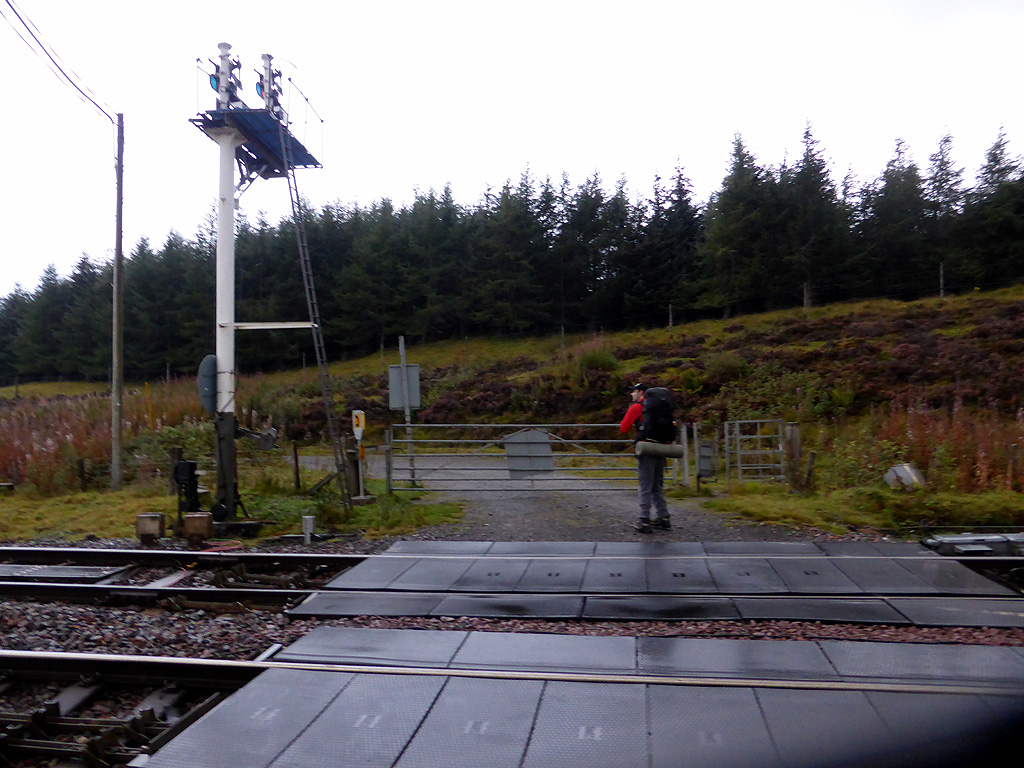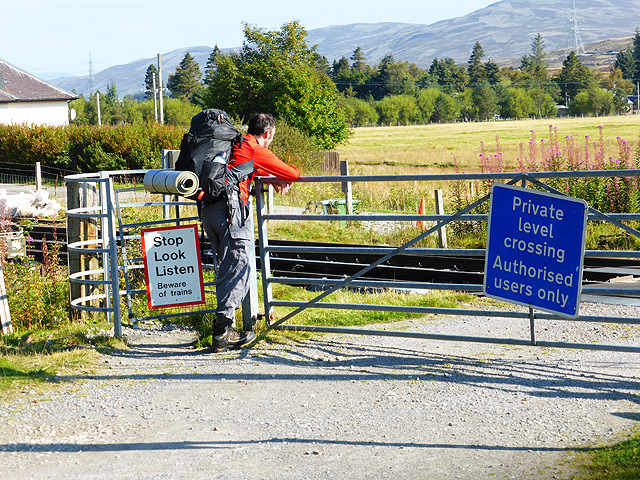A Scottish walking charity has condemned Network Rail for putting “impenetrable walls” between the public and the countryside by closing more than 1,250 level crossings in Britain since 2009.
Ramblers Scotland argue that the mass closure of level crossings, such as the Highland level crossing at Dalwhinnie, is obstructing routes for walkers and local communities.
Network Rail, which owns and maintains Britain’s rail networks, claimed the closures are necessary to reduce risk to the public. However, campaigners say the risks are overstated.
The debate around public access and level crossings was brought into the spotlight in 2020 when the rail company padlocked gates at the frequently used Dalwhinnie crossing.
The crossing is a key access point to a historic route that predates the railway and leads to the Ben Alder estate, which includes one of Scotland’s most remote Munros.
Campaigners were angry that the rail company did not consult locals, outdoors groups or the landowner. They argued the closure breached Scotland’s Right of Way law, but Network Rail claimed there were no public access rights over the crossing.
This approach risks turning many rural rail lines into impenetrable walls that cut communities and walkers off from the countryside that they now need to access more than ever to support their health and wellbeing.
Brendan Paddy, Ramblers Scotland
The move sparked a backlash, which resulted in a more than 9,000-signature petition and an open letter signed by outdoors groups, local business owners, the local community council, Highland Council’s access officer and two local MSPs.
Ramblers Scotland has now warned that the closures are part of a more than decade-long trend from the publicly-owned rail body.
“Sadly, Network Rail appears to view shutting level crossings as an admirable objective – even boasting on its website of closing more than 1,250 across Britain since 2009,” said Ramblers Scotland director, Brendan Paddy.
“This approach risks turning many rural rail lines into impenetrable walls that cut communities and walkers off from the countryside that they now need to access more than ever to support their health and wellbeing.”
‘Legal duty’ to assess level crossing risk
Network Rail’s states there are around 6,000 level crossings in Britain. “Every day they are used by thousands of people to cross one of the busiest rail networks in the world,” it says.
The rail operator argues it has “a legal duty to assess, manage and control the risk for everyone” and it can “eliminate risk by closing crossings where agreement can be reached to do so.”
Using freedom of information law, Paddy asked Network Rail to provide any information it holds on serious safety incidents involving pedestrians at the 440 level crossings in Scotland over the last five years.
But the rail firm said it could “neither confirm nor deny” any incidents. Revealing any details “would say something about the location of deaths on the network,” it argued.

“Research has shown that identifying locations where deaths have occurred, whether or not by suicide, also potentially creates a trigger for vulnerable individuals who are considering suicide,” added Network Rail.
Data from the Office of Road and Rail (ORR), which regulates Network Rail reveals five fatalities at level crossings involving the public across Scotland, England and Wales in 2020/21 and two fatalities both in 2019/20 and 2018/19.
“Near misses” at level crossings with pedestrians increased to 342 in 2020/21 – the highest since 2002/03, when the figures began, according to the data.
But Ramblers Scotland argues that roads are considerably more dangerous, with 812 pedestrians having been injured on Scotland’s roads – 34 of whom died – in 2020 alone.
The closure of the level crossing at Dalwhinnie is a key example of the “very real” consequences closures can have for visitors, locals and tourism businesses, argued Paddy.
Highlands and Islands Green MSP, Ariane Burgess, who signed the open letter opposing the closure of the crossing at Dalwhinnie, said she had received “numerous complaints” from constituents.
“Whilst I understand the need for safety, by closing a crossing on a well-known walking route, Network Rail are causing more acute health and safety issues as walkers simply jump the fence,” she told The Ferret.
“They should be consulting fully with communities before making decisions which can impact the accessibility of amenities for residents and prevent enjoyment of established walking paths for locals and tourists alike.”
Network Rail claimed the crossing was never intended for public use and only to provide access for the landowner and other “permitted” users. Those hoping to cross the line can use a tunnel located a mile away from the closed level crossing, the rail firm said.
“We are conducting a detailed review of alternative options for Ben Alder, looking at the likely costs, timescales, and practicality of potential works at the crossing,” said a spokesman.
“The options under review include new pathways and whether a technological solution can be implemented.”
But he added: “The opening of the level crossing to the public is highly unlikely to be an outcome of this review. Once complete, we will share the findings of the review with the local community and other stakeholders.”
Cover image credit: John Lucas















Network Rail should be obliged to create some alternative”safe” way for the public to cross the line. How many trains per hour go along the Dalwhinnie stretch. As many as one? Who was using this path first, the locals or the raiway?
An underpass would enable crossing, without the risk of a suicide jumping from an overpass, if suicide is what Network Rail are attempting to prevent.